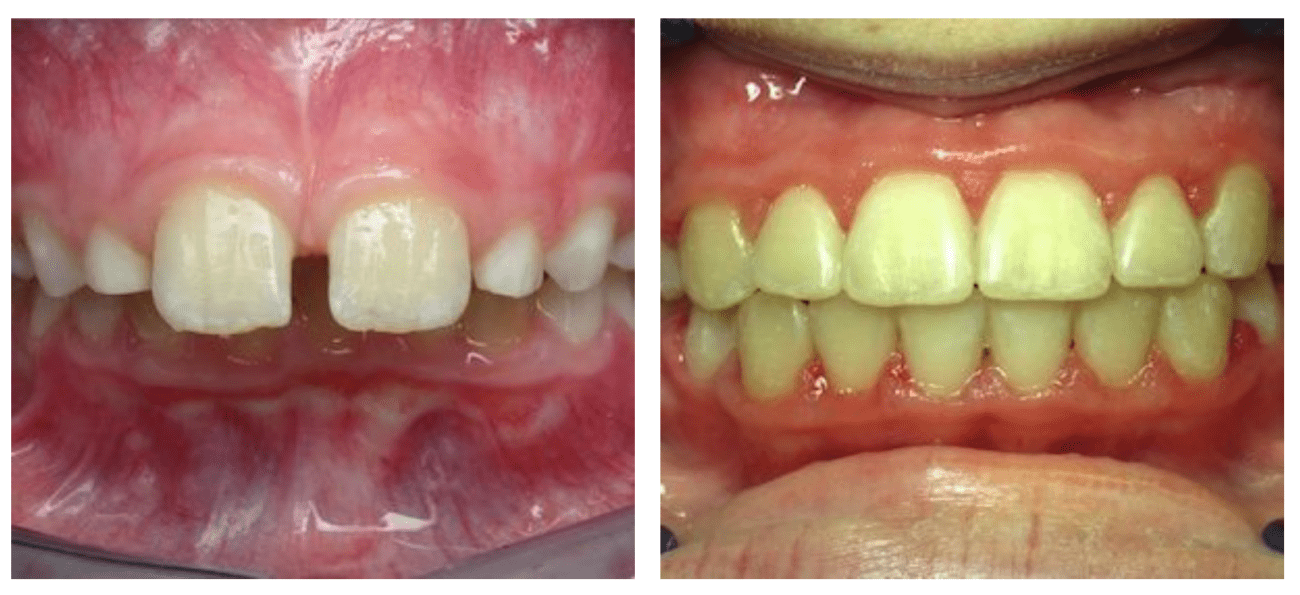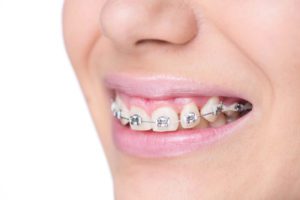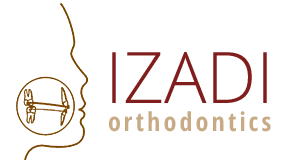Overbite: An Overview
Most people agree that a perfect smile is one that is not only bright and white but one that is also aligned correctly. Overbites, also sometimes called ‘buck teeth’, are misalignments that some people choose to embrace and live with. This cosmetic concern can also lead to other dental problems, such as damage to other teeth, gums, and tongue from accidentally biting it.

Overbites are a form of malocclusion that causes the top jaw to protrude over the bottom arch of teeth. Overbites vary in severity and will be treated accordingly. Minor overbites to more prominent overbites should be treated as early on in development as possible. Early intervention for the treatment of overbites can deter further damage to the teeth and gums and prevent long-term oral health complications.

A 7 years, 8 months old male patient with a severe Overbite (upper teeth totally covering the lower front) and severe Overjet (lower teeth all sitting too far back) with a huge gap between the upper and lower front teeth, combined with lack of the growth of the lower jaw (mandible)! Phase I (skeletal modification and mandibular advancement) in 12 months, maintenance with a retainer in 12 months, and Phase II (full braces) in 20 months.
Causes of Overbites
A variety of factors can cause overbites. They are often hereditary when certain jaw shapes are passed down through generations. Extra teeth or missing teeth can impact the alignment of your front teeth, causing an overbite.
Most often, we see patients that develop an overbite because of myofunctional habits. Poor myofunctional habits can force the top jaw forward during the early stages of jaw development. These include bottle feeding, thumb sucking, and pacifier usage for too long. When these habits continue past the age of 3 or 4 or when permanent teeth are emerging, the pressure that is created from the sucking can cause teeth to come in at an abnormal angle.
Tongue thrusting is also a common cause of buck teeth in children. This occurs when the tongue presses too far forward in the mouth, putting pressure on the teeth. This most often causes an open bite but can also lead to an overbite. The tongue presses forward because of severely swollen tonsils or adenoids as well as poor swallowing habits.
Dr. Izadi uses precise and thorough bite analysis to determine the structural cause of the overbite for more accurate treatment. Early intervention can correct these habits in children preventing more severe overbites. Izadi Orthodontics uses two-phase treatment plans to adjust bites in developing jaws. Our state-of-the-art orthodontic office offers innovative digital technology and 3-D imagining for more accurate functional analysis.

Overbite Treatment
Treating overbites will vary depending on the severity of the malocclusion, the functional underlying cause, and the personal goals of each patient. Dr. Izadi and our orthodontic team work one-on-one with our patients to ensure thorough, high-quality orthodontic care. We provide a range of modern orthodontic services to meet the needs of patients of all ages.
Early intervention is ideal for the treatment of an overbite. Parents are encouraged to bring their children in for an orthodontic exam to help them correct their bite alignment and prevent speech and facial developmental issues.
Through education and long-term support, Izadi Orthodontics helps patients correct their bite and maintain results. We strive to minimize the potential for orthodontic relapse and follow up with our patients well over a year after treatment.
Overbite FAQs
What is an overbite?
An overbite occurs when the top arch of teeth protrudes over the bottom arch of teeth. Overbites can cause excessive tension in the jaw and can disrupt oral development.
Can an overbite affect my child’s development?
Severe overbites can impact the development of your child’s speech and the structure of their jaw and face. Izadi Orthodontics offers phased treatment options for the early intervention and treatment of overbites. Phased treatment can prevent future oral health complications, correcting the bite before it impacts your child’s oral development.
Can I treat an overbite in adulthood?
Yes. Izadi Orthodontics offers treatments tailored to the needs of adults with overbites. Some patients may not have had the opportunity to correct their overbite in their youth. As an adult, patients can benefit from treating their overbites. Treating an overbite can improve oral health, reduce jaw tension or discomfort, and improve the aesthetics of the patient’s smile.
How long does it take to correct an overbite?
On average, it takes about six months to two years to correct an overbite. There are multiple options for correcting an overbite. If you are interested in aligning your smile, call us today to schedule an appointment. We can discuss all of your options and find a plan that works best for you.
Do overbites cause double chin?
Patients with overbites may be more prone to having a double chin. When patients have an overbite, their lower jaw is generally too small. This results in the chin being weak and muscles not being used, causing a double chin.
Do overbites get worse with age?
An overbite may worsen as you age, and the space between upper and lower teeth may grow. Orthodontic treatment may take longer the more time you wait to correct your overbite.
Does overbite change your face?
Correcting an overbite can alter the appearance of your face. Overbites may distort the shape of your face as well as impair one’s ability to speak clearly.
Does overbite cause headaches?
An overbite can lead to a variety of issues, including headaches. It may also cause pain and discomfort in the jaw, ear, and neck.
